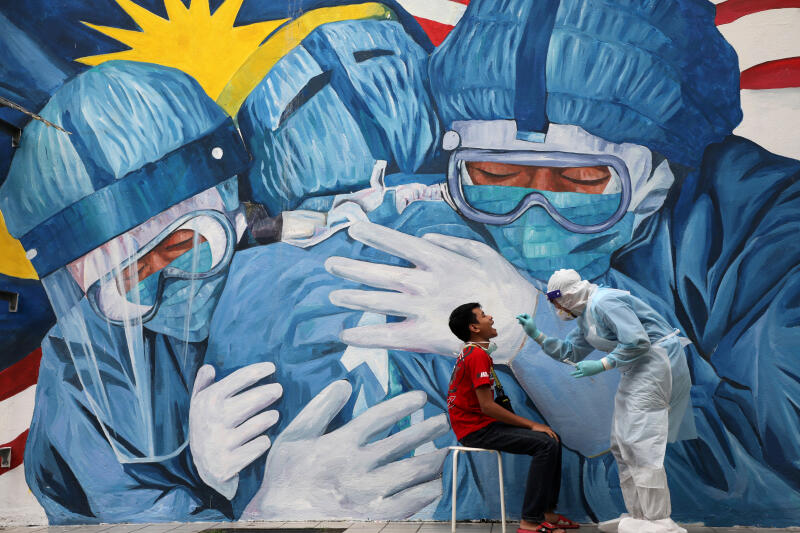Malaysia's chaotic virus warfare: Sin Chew Daily
The paper says that in the event the B117 variant from the UK happens to land on Malaysia's shores, the country's health system could collapse in no time.
Sign up now: Get insights on Asia's fast-moving developments

Given the daily four-digit increase in new infection numbers and the increasingly lax SOPs in Malaysia, hitting 200,000 cases is not impossible before mid-February, says the paper.
PHOTO: REUTERS
KUALA LUMPUR (SIN CHEW DAILY/ASIA NEWS NETWORK) - Health director-general Noor Hisham Abdullah's series of announcements seems to declare to the world that Malaysia's coronavirus outbreak is almost out of control.
Our modular hospitals are bursting at the seams, asymptomatic patients are encouraged to go on home quarantine, infected patients are discharged early without screening, Serdang makeshift hospital is seriously understaffed, the environment at Penang modular hospital is poor, and the earliest vaccine rollout will be in March... and a whole lot more.
We have just breached the 120,000-mark and our health institutions are already finding it hard to cope.
Given the daily four-digit increase in new infection numbers and the increasingly lax SOPs at this moment, hitting 200,000 is not impossible before mid-February.
And were the B117 variant from UK to land on our shores, the country's health system could collapse in no time.
There are now more than 86.5 million confirmed Covid-19 cases worldwide, with over 18 countries reporting more than a million cases each.
When the infection number comes to a tipping point, the virus will irreversibly spread wildly, as observed in the US, India, Brazil, Russia, France, UK and the like.
Whenever a new high is recorded, the trend will go continually upward after staying put for several days. In the event it trends down momentarily, there is no cause for celebration, as the next wave of infections and possibly new strains are waiting to strike.
Looking back at the country's year-long war against the virus, the Movement Control Order (MCO) first implemented on March 18 last year indeed produced some desirable results.
But that is possibly because we didn't have too many cases back then and the spread was therefore limited, thus giving the misconception that things were under control.
Because of the adverse effects of the MCO, we later came up with much the milder versions of Conditional Movement Control Order, Recovery Movement Control Order and community-specific Enhanced Movement Control Order while lifting travel bans across state and district borders as an expedient solution to balance between helping the economy and fighting the virus.
If members of the public, local businesses and their employees, in particular migrant workers, were more self-disciplined in SOP compliance while the restrictions were loosened, we should have been able to slow down the spread of the virus and keep it largely manageable, at least until vaccines are made available here.
Unfortunately, we missed that "transition period" while waiting for the vaccine, and the virus was allowed to spread rapidly since last September, so much so that we now find ourselves completely overwhelmed and helpless.
With only 120,000 cases recorded so far, our health director-general has already declared that our modular hospitals are bursting at the seams, and asymptomatic cases or cases with light symptoms are encouraged to go on home quarantine.
We have no idea how the authorities define "light symptoms" and home quarantine SOPs, though.
Take Taiwan for example, where infected patients are sent to the hospital in an ambulance while uninfected close contacts are put on home quarantine and people living within the same house are told to move out or stay in designated hotels for quarantine.
All the subjects will be tracked by health authorities twice a day. We do not do that here in Malaysia.
In Malaysia, infected individuals with light or no symptoms can still stay in the same house as their family members, which is extremely inadvisable as the entire household will eventually get infected.
As if that is not enough, the family members will still have to leave the house to buy food and essentials, and that will take the virus to grocery stores, hypermarkets and elsewhere.
In view of this, Dr Noor Hisham must reverse this decision. Dr Noor Hisham's second argument is that if the level of virus infection decreases, the patient can be discharged without being tested after ten days in a hospital. This is contrary to WHO requirements.
Dr Noor Hisham should not have done things this recklessly. Apparently he has lost his direction.
As for the vaccine rollout, he said this would depend on the progress between vaccine manufacturers and the National Pharmaceutical Regulatory Agency (NPRA). He said so far there is only one vaccine that has been sent for NPRA registration.
As a matter of fact, during this crucial moment, he should have sought emergency approval from relevant government authorities instead of doing nothing.
Sin Chew Daily is a member of The Straits Times media partner Asia News Network, an alliance of 23 news media organisations.


